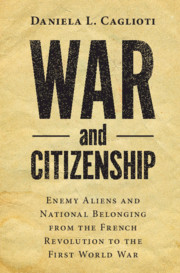 War and Citizenship
War and Citizenship Book contents
- War and Citizenship
- Human Rights in History
- War and Citizenship
- Copyright page
- Dedication
- Contents
- Table
- Acknowledgments
- Note on Translation
- Abbreviations
- Introduction
- Part I Background
- Part II The First World War
- 4 War, State of Emergency and Early Measures (1914)
- 5 Targeting Internal Enemies and Enemy Aliens (1914)
- 6 Consolidating the Policies (1915–1917)
- 7 Repression and the Economic War (1915–1917)
- 8 Globalizing and Radicalizing the Policies on Enemy Aliens (1917–1918)
- 9 From Citizens to Enemy Aliens (1914–1923)
- Part III Aftermath
- Endnotes
- Works Cited
- Index
9 - From Citizens to Enemy Aliens (1914–1923)
from Part II - The First World War
Published online by Cambridge University Press: 30 October 2020
- War and Citizenship
- Human Rights in History
- War and Citizenship
- Copyright page
- Dedication
- Contents
- Table
- Acknowledgments
- Note on Translation
- Abbreviations
- Introduction
- Part I Background
- Part II The First World War
- 4 War, State of Emergency and Early Measures (1914)
- 5 Targeting Internal Enemies and Enemy Aliens (1914)
- 6 Consolidating the Policies (1915–1917)
- 7 Repression and the Economic War (1915–1917)
- 8 Globalizing and Radicalizing the Policies on Enemy Aliens (1917–1918)
- 9 From Citizens to Enemy Aliens (1914–1923)
- Part III Aftermath
- Endnotes
- Works Cited
- Index
Summary
Chapter 9 deals specifically with the way in which the war affected the notions and practices of citizenship. It does so by switching the attention from enemy aliens to citizens of enemy origins. The chapter concentrates firstly on an analysis and discussion of the naturalization policies adopted by the various belligerent countries during the First World War. It then examines the spread of denaturalization statutes across Europe and the emergence of statelessness, concentrating both on state attitudes and public opinion and on the impact of naturalization and denaturalization policies on people of enemy origin. It also looks past the end of the war at the impact of those policies on interwar developments in inclusion and exclusion. The war played a crucial role in stabilizing differences between citizens and aliens and making them starker. It also imposed markers of identity (nationality, language, religion, ethnicity, “race”) on people, often regardless of their will or choice. In the name of military necessity and national security, authorities were willing to investigate origins and parentage or kinship, religion, language and all the markers that could indicate disloyalty to the nation in arms, thus implementing rigid notions of citizenship/subjecthood.
Keywords
- Type
- Chapter
- Information
- War and CitizenshipEnemy Aliens and National Belonging from the French Revolution to the First World War, pp. 262 - 286Publisher: Cambridge University PressPrint publication year: 2020
